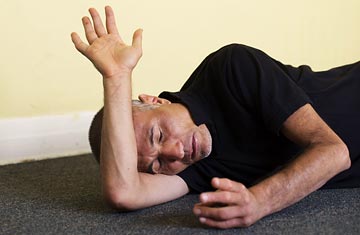September 9th, 2015 by Dr. Val Jones in Health Tips, True Stories
1 Comment »

Photo Cred: Max S. Gerber
I learned a valuable lesson recently about how difficult it can be to make the correct diagnosis when you see a patient for a very short period of time. In the acute rehab setting I admit patients who are recovering from severe, life-altering brain events such as strokes, head injuries, and complex medical illnesses. It is challenging to know what these patients’ usual mental function was prior to their injuries, and so I rely on my knowledge of neuroanatomy, infectious disease, and pharmacology to guide my work up. However, I have learned that asking the patient’s family members about what they were like (in their healthier state) is extremely important as well. Personality quirks, likes and dislikes, and psychiatric history all offer clues to ongoing behavioral challenges and mental status changes.
This fact was never clearer than when I met an elderly gentleman with a new stroke. He was extremely drowsy, non-participatory, and was not oriented to anything but his name. The stroke had occurred in a part of the brain that does not affect cognition, so I began to wonder if he had an infection or was having a reaction to a medication. I carefully ruled out all possible sources of infection, and I combed through his medication list and removed any potentially sedating drugs. His mental status remained unchanged for several days. I then began to wonder if perhaps he was suffering from significant dementia at baseline, and that he was living at home with more help from his family than they had initially reported. The therapy team and I began to consider a transfer to a nursing home. The family was horrified by the idea.
As it turned out, his grandson shared with me that he believed that the patient was autistic. Because his grandpa was elderly, he grew up in a time where not much was known about autism, and diagnoses of the condition was rarely made. He was therefore never formally diagnosed, but had many of the textbook characteristics. His stroke, combined with a sudden transfer to an inpatient hospital setting, was very distressing for the patient, and he had shut down to protect himself from the mental anguish. The “dementia-like” behavior that we were witnessing was merely an acute psychological reaction.
Armed with this new information, the therapy team requested family members to be present during all sessions – to encourage participation and to provide comfort and normalization of the transition from home to hospital. The patient responded beautifully, and made remarkable gains in his ability to walk and participate in self care activities.
I apologized profusely to the family for our period of confusion about his diagnosis and care needs, and offered reassurance that we would do our very best to help him recover from his stroke so that he could go home directly from the hospital. He did in fact return home, and with a little extra help from his daughters, he is enjoying his usual projects and activities.
As for me, I will never presume dementia without careful family confirmation again.
January 13th, 2015 by Dr. Val Jones in Health Policy, Opinion
7 Comments »
 It’s no secret that medicine has become a highly specialized business. While generalists used to be in charge of most patient care 50 years ago, we have now splintered into extraordinarily granular specialties. Each organ system has its own specialty (e.g. gastroenterology, cardiology), and now parts of systems have their own experts (hepatologists, cardiac electrophysiologists) Even ophthalmologists have subspecialized into groups based on the part of the eye that they treat (retina specialists, neuro-ophthalmologists)!
It’s no secret that medicine has become a highly specialized business. While generalists used to be in charge of most patient care 50 years ago, we have now splintered into extraordinarily granular specialties. Each organ system has its own specialty (e.g. gastroenterology, cardiology), and now parts of systems have their own experts (hepatologists, cardiac electrophysiologists) Even ophthalmologists have subspecialized into groups based on the part of the eye that they treat (retina specialists, neuro-ophthalmologists)!
This all comes as a response to the exponential increase in information and technology, making it impossible to truly master the diagnosis and treatment of all diseases and conditions. A narrowed scope allows for deeper expertise. But unfortunately, some of us forget to pull back from the minutiae to respect and appreciate what our peers are doing.
This became crystal clear to me when I read an interview with a cardiologist on the NPR blog. Dr. Eric Topol was making some enthusiastically sweeping statements about how technology would allow most medical care to take place in patient’s homes. He says,
“The hospital is an edifice we don’t need except for intensive care units and the operating room. [Everything else] can be done more safely, more conveniently, more economically in the patient’s bedroom.”
So with a casual wave of the hand, this physician thought leader has described a world without my specialty (Physical Medicine & Rehabilitation) – and all the good that we do to help patients who are devastated by sudden illness and trauma. I can’t imagine a patient with a high level spinal cord injury being sent from the ER to his bedroom to enjoy all the wonderful smartphone apps “…you can get for $35 now from China.” No, he needs ventilator care and weaning, careful monitoring for life-threatening autonomic dysreflexia, skin breakdown, bowel and bladder management, psychological treatment, and training in the use of all manner of assistive devices, including electronic wheelchairs adapted for movement with a sip and puff drive.
I’m sure that Dr. Topol would blush if he were questioned more closely about his statement regarding the lack of need for hospital-based care outside of the OR, ER and ICU. Surely he didn’t mean to say that inpatient rehab could be accomplished in a patient’s bedroom. That people could simply learn how to walk and talk again after a devastating stroke with the aid of a $35 smartphone?
But the problem is that policy wonks listen to statements like his and adopt the same attitude. It informs their approach to budget cuts and makes it ten times harder for rehab physicians to protect their facilities from financial ruin when the prevailing perception is that they’re a waste of resources because they’re not an ICU. Time and again research has shown that aggressive inpatient rehab programs can reduce hospital readmission rates, decrease the burden of care, improve functional independence and long term quality of life. But that evidence isn’t heeded because perception is nine tenths of reality, and CMS continues to add onerous admissions restrictions and layers of justification documentation for the purpose of decreasing its spend on inpatient rehab, regardless of patient benefit or long term cost savings.
Physician specialists operate in silos. Many are as far removed from the day-to-day work of their peers as are the policy wonks who decide the fate of specialty practices. Physicians who have an influential voice in healthcare must take that honor seriously, and stop causing friendly fire casualties. Because in this day and age of social media where hard news has given way to a cult of personality, an offhanded statement can color the opinion of those who hold the legislative pen. I certainly hope that cuts in hospital budgets will not land me in my bedroom one day, struggling to move and breathe without the hands-on care of hospitalists, nurses, therapists, and physiatrists – but with a very nice, insurance-provided Chinese smartphone.



 It’s no secret that medicine has become a highly specialized business. While generalists used to be in charge of most patient care 50 years ago, we have now splintered into extraordinarily granular specialties. Each organ system has its own specialty (e.g. gastroenterology, cardiology), and now parts of systems have their own experts (hepatologists, cardiac electrophysiologists) Even ophthalmologists have subspecialized into groups based on the part of the eye that they treat (retina specialists, neuro-ophthalmologists)!
It’s no secret that medicine has become a highly specialized business. While generalists used to be in charge of most patient care 50 years ago, we have now splintered into extraordinarily granular specialties. Each organ system has its own specialty (e.g. gastroenterology, cardiology), and now parts of systems have their own experts (hepatologists, cardiac electrophysiologists) Even ophthalmologists have subspecialized into groups based on the part of the eye that they treat (retina specialists, neuro-ophthalmologists)!







